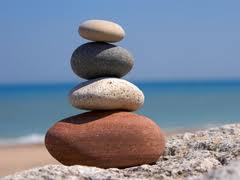Life isn't about how you survived the storm - it's about how
you danced in the rain!
I began my journey
this week into gentle Hatha Yoga which, for these classes, combined yoga movements with the glorious
sound of Tibetan & crystal bowls, gongs and bells which is thought to improve
the movement within cells, meridians, breath and deepen the relaxation
response within our nervous system.
I have always been a big fan of crystal bowls and bringing
together the amazing reverberation and healing power of sound with yoga is, at
least for me, a extraordinary experience.
Yoga's combined focus (mindfulness, breathing
and physical movement) is known to stimulate many health benefits. Yoga
participants indicate they sleep better have increased energy levels, improved muscle
tone, experience relief from pain and stiffness, and generally experience overall
better health. The breathing aspect of
yoga can also benefit heart rate and blood pressure.
Hatha Yoga which has been practiced for thousands of
years is a compilation of physical postures and movements called asanas.
Combined with mindful breathing it produces a relaxed state that encourages a
deepened meditation. And I have to say, after our 90 minute class I was totally
relaxed and had a peaceful sense of calm which was very comforting after a very
stressful day.
This was not as strenuous as other practiced forms of
yoga, it was slow and gentle and allowed for a more relaxed and laid back
workout. Gentle yoga is ideal for those
with mobility issues, the elderly and women who are pregnant.
What I appreciate is it's restorative aspect, used to prompt
the parasympathetic nervous system,
which balances the body. By stimulating this system, you can experience a lower
heart rate and blood pressure. It also helps to stimulate the immune and
endocrine systems. When stressed or overwhelmed, it's the parasympathetic nervous
system that restores balance to the body.
Many spas and wellness centres offer yoga classes, or alternatively check out a yoga program in your community and enjoy the many benefits of bringing together
mindfulness, breathing and physical movement.
The term YOGA comes from a Sanskrit word which means yoke or union. Traditionally, yoga is a method joining the individual self with the Divine, Universal Spirit, or Cosmic Consciousness. Physical and mental exercises are designed to help achieve this goal, also called self-transcendence or enlightenment.
On the physical level, yoga postures, called asanas, are designed to tone, strengthen, and align the body. These postures are performed to make the spine supple and healthy and to promote blood flow to all the organs, glands, and tissues, keeping all the bodily systems healthy. On the mental level, yoga uses breathing techniques (pranayama) and meditation (dyana) to quiet, clarify, and discipline the mind. However, experts are quick to point out that yoga is not a religion, but a way of living with health and peace of mind as its aims.
Yoga has been used to alleviate problems associated with high blood pressure, high cholesterol, migraine headaches, asthma, shallow breathing, backaches, constipation, diabetes, menopause, multiple sclerosis, varicose veins, carpal tunnel syndrome and many chronic illnesses. It also has been studied and approved for its ability to promote relaxation and reduce stress.
Yoga can also provide the same benefits as any well-designed exercise program, increasing general health and stamina, reducing stress, and improving those conditions brought about by sedentary lifestyles. Yoga has the added advantage of being a low-impact activity that uses only gravity as resistance, which makes it an excellent physical therapy routine; certain yoga postures can be safely used to strengthen and balance all parts of the body.
Meditation has been much studied and approved for its benefits in reducing stress-related conditions. The landmark book, The Relaxation Response, by Harvard cardiologist Herbert Benson, showed that meditation and breathing techniques for relaxation could have the opposite effect of stress, reducing blood pressure and other indicators. Since then, much research has reiterated the benefits of meditation for stress reduction and general health. Currently, the American Medical Association recommends meditation techniques as a first step before medication for borderline hypertension cases.
Modern psychological studies have shown that even slight facial expressions can cause changes in the involuntary nervous system; yoga utilizes the mind/body connection. That is, yoga practice contains the central ideas that physical posture and alignment can influence a person's mood and self-esteem, and also that the mind can be used to shape and heal the body. Yoga practitioners claim that the strengthening of mind/body awareness can bring eventual improvements in all facets of a person's life.









